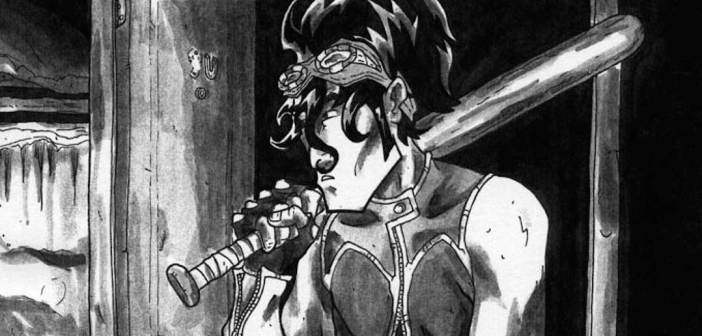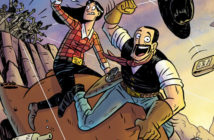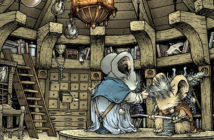26-year-old Colin Panetta is no stranger to the weird and fantastic. His original comic book, Dead Man Holiday is a freakishly fun ride through a fictionalized distant future loaded with monsters and mayhem. But don’t take my word for it—check out his stories at www.DeadManHoliday.com, where everyone is able to download free PDF issues of the book.
Panetta’s creativity stems, in part, from his personal knack for adventure and wit—at age six he convinced his teenage babysitter to let him dive hungrily into a jar of grape jelly with a spoon. He also used to munch on whole onions as if they were apples. Currently residing in Florida, Panetta enjoys a three-year relationship with his girlfriend and spending time with his faithful dog, Gordon Greenspan, when not creating comics.
I recently had the opportunity to exchange some questions with the creator. We discussed his original works in comics, his views of art, and where the major comics industry is heading.
Steven Surman: To begin, let me pose to you a dreadfully standard question: When did you first become interested in art?
Colin Panetta: At an age too early for me to remember. From what I hear, I always drew. I was an only child deep in the country with no neighbors, so drawing and reading comics were something to do. Most people in this scenario would call it an “escape,” but I wouldn’t characterize my relationship with it as such. It was what I enjoyed doing the most out of the things I had access to.
Growing older I became “the kid who could draw” in my small class, and received a lot of encouragement from my teachers and a lot of praise from my peers for my renditions of Sonic the Hedgehog. I enjoyed drawing often, but never worked really hard at it.
I was never really pushed by anyone artistically, including myself, until I took some after-school classes with a local artist. That was the first time I took art kind of seriously, and I was pretty intimidated by how hard it was. Then I went to college and became too busy to do it for a few years. I didn’t even buy comics for a while in there.
SS: Your artwork is incredibly solid; from looking at and reflecting upon it, I get the impression that you’re confident in your craft. How long have you been developing yourself as an artist?
CP: Wow, thanks. I had a ton of really casual drawing time growing up and in school, but I didn’t really buckle down until after college. That was about three years ago. If I look confident, I think it’s because I’m trying to express my love and excitement about comics on every page. I’m not really that confident in my own abilities, but I’m very confident in comics.
SS: Have you had any formal education in art?
CP: I had the high school classes that I mentioned. I went to college for graphic design, but the school I went to required a couple of years of more general art courses first, in addition to a bunch of general studies classes. I’m not sure if I’ll ever know what I learned during that time. Sometimes I think it had very little impact, sometimes I think it was more substantial. A few things really stuck with me. A teacher telling me to pay attention to the effect that the thickness of my lines have on how heavy the drawing looks pops into my head every now and then—a few things like that. I learned a lot looking at other people and seeing their relationships to art, which I had never really seen before and helped me define what mine was. One time during a critique, a teacher told me that my work looked like it was making fun of the other students’ work, and I realized that it often was.
SS: Concerning comics, what are some of your favorite titles?
CP: Hoo boy—I like the detached earthiness of Hellboy and B.P.R.D. I like the unbridled enthusiasm of early Madman. I like the comic book realism of Love and Rockets. I like the sugary artistry of Cold Heat. I like the epic earnestness of Bone. I mean, pretty much the same stuff everyone likes, I think.
SS: When did you first decide to try your hand at creating your own comics?
CP: I always figured that I would do it. Reading Teenage Mutant Ninja Turtles Adventures on the way home from the mall with my parents by the intermittent headlights of the cars passing us, they just seemed like the coolest thing around. And why wouldn’t I want to do the coolest thing around?
When I started to get a little serious at the end of high school I did a Dead Man Holiday mini-comic that I passed out to some of my friends. It has a print run of like fifteen, maybe. During my last couple years of college the idea started coming back to me, and I was just waiting to graduate so I could get going on it. And then I did.
SS: If you were to summaries the general plot of your original comic, Dead Man Holiday, how would you describe it?
CP: Dead Man Holiday is a haunted science-fiction comic that takes place in an imagined future. The protagonist’s name is Thad Planck and he’s a security guard for a low-rent security agency. They have a contract from the city to keep tabs on Little Atlantis, the section of the city that’s flooded and abandoned. Usually it’s totally boring, but lately he’s been encountering increasingly strange creatures there. It’s a quiet, cinematic, black and white, and a very weird monster comic.
SS: Where did the idea for Dead Man Holiday come from?
CP: It developed over time. It’s basically just a collection of things that I want to draw, which is pretty much just weird monsters. I’m not really a writer, so I just put myself in as the protagonist. What would happen if I encountered weird monsters? They’d probably beat me up. So I’ll make a comic about a guy who gets beat up by weird monsters. Sold! It’s developed into more than that since then, but that’s where it started. Thad isn’t really me anymore.
SS: The first issue of Dead Man Holiday is numbered as “-3” (minus three) — why are you using this method of numbering?
CP: Maybe a lot of people feel this way about their first series, but I think I’m going to be sticking with this for a long time. When it was time to start doing comics, I didn’t want to do anything else, but I didn’t feel up to the task of drawing that all important issue #1. It’s always the first issue everyone reads and I wanted it to be good, or at least a lot better than I was at the time. So I gave myself a bit of a head start so I could build up some speed. When I have the three negative issues done I’ll collect them into one book and call it “Number Zero.”
There’s a reason in the plot of the book for numbering it that way as well. It’ll be obvious when it happens.
SS: Dead Man Holiday has an interestingly weird and speculative mood to it, largely because of your starkly engrossing illustrative power. You’ve captured a really exciting combination of dark fantasy and sci-fi — what drew you to working in such a compelling, albeit narrow, genre?
CP: It’s what I’m interested in, and kind of how I see the world. Something about setting a situation in those genres makes a story come alive for me. I’m interested in very little that couldn’t be placed in one of them in some way. I think comedies are funnier when they’re gut-wrenching horror and dramas are more gripping when they’re in space. Something about recognizable emotions set against a fantastic backdrop really speaks to me. They more closely resemble the way the world looks to me. Life is exciting and weird and crazy, and those types of settings illustrate those feelings to me much more effectively than attempting to their imitation instead.
SS: Is there any horror, sci-fi, or fantasy fiction (including comics) that you enjoy and draw inspiration from?
CP: For some reason, those influences don’t really seem to come from comics. I’m a huge Evil Dead 2 fan. The amount of energy and creativity they packed into that movie is remarkable. I also really love Cemetery Man, an arty Italian zombie movie, for being so weird. Beyond Thunderdome is a big one for me. There are some really touching themes and ideas in that movie, and I think they’re bolstered by the insane setting. More subtle examples of effective genre use similar to what I was describing are The Truman Show and Whale Rider.
SS: You said in the prologue of your comic’s second installment (# -2) that you reject archetypes. What exactly do you mean by this?
CP: The vast majority of what I see on comic book stands is based around concepts that have been explored by countless writers throughout the last hundred years. I’m talking about superheroes, camp horror and pulp, zombies—all that stuff. Seeing so many different, often sub-par, versions of those concepts robs them of their power for me—to the point where if I even see the word “zombie” or whatever on a book I get a pre-emptive jolt of incredible boredom. So I’m just trying to go the other way and make something new and hopefully interesting.
Obviously, a lot of what I do is going to be rooted in that stuff; so was “that stuff” when it was “first” conceived. But my goal is to come up with the freshest concepts I can, rather than recreate or even comment on what’s come before.
SS: Now, you both illustrate and write Dead Man Holiday. Would you ever consider collaborating your artistic talent with an outside writer on another project or possibly future issues of Dead Man Holiday?
CP: This is something I think a lot about, because one of comics’ strengths is that they are one of the few storytelling mediums that can be created in their entirety by a sole artist. But I really like the idea of collaboration. It seems really fun and exciting, and I’m looking for ways to get into it. I’m working on a few short comic stories with some friends of mine who aren’t comic book people. I’ve got a story about a scientist, another about a mansion, one about a friend’s dreams and another about shadow people. I don’t know which will come to pass or not, but if I do enough I assume I’ll collect them into an anthology of some sort.
Sometimes I daydream about having someone help me write an issue of Dead Man Holiday, usually when I’m stuck and don’t know what to do. But when I think about explaining to them what I’m trying to do, it just seems ridiculous. I don’t know if I could even put my intentions into words if I wanted to. I would be open to someone else doing something, though—a Dead Man Holiday strip of their own. I have a lot of guest art in the print editions of the comic; I love seeing other people’s interpretations of my work. It’s selfish, but I think it’s really fun for the reader too.
More likely than any of that, though, I think I would be into writing for another artist. I never really thought I would, but I have more ideas than the incredibly slow process of drawing comics allows me to realize, and I’ve really gotten into the writing aspect of it. Anything I did like that would probably be a lot more straightforward and overtly fun than Dead Man Holiday.
SS: Is there something that you’re not receiving from today’s comic book industry that you’re trying to convey through your own creative endeavors?
CP: Yeah, there’s not a lot on the stands for me. I’m pretty solidly middlebrow, maybe leaning toward lowbrow. Most books these days are either really, really smart or really, really stupid. I’m not really trying to convey that in my work, but I wouldn’t be surprised if I ended up somewhere in that middle area.
SS: So, what’s next on your creative agenda?
CP: More Dead Man Holiday! The next issue will be out a bit before the end of the year, and then I’ve got a lot of fun stuff planned for the series before it moves into positive numbers. People should keep an eye on DeadManHoliday.com, or even better, become fans on Facebook, to keep up to date.
I’d like to personally thank Colin Panetta for taking the time to speak with me and everyone else over at Comic News. For anyone interested in learning more about Panetta’s original work, Dead Man Holiday, check out his Web site at www.DeadManHoliday.com, where free PDF issues of his comics can be downloaded.
This interview originally appeared on Comic News on 23 April 2009.




